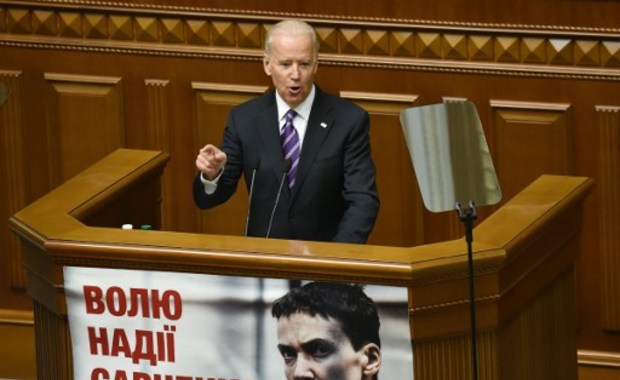
Biden Issues Warning to Oligarchs as Corruption Accusations Fly in Ukraine
Publication: Eurasia Daily Monitor Volume: 12 Issue: 222
By:

Now may be the last chance to stop corruption from eroding the foundations of the Ukrainian state, the United States’ Vice President Joe Biden told local politicians during his visit to Kyiv on December 6–8. Addressing the Ukrainian parliament on December 8, he warned against repeating the mistakes of the 2004 Orange Revolution, after which oligarchs returned to power amid squabbles between then-president Viktor Yushchenko and then–prime minister Yulia Tymoshenko. Biden cautioned that Moscow could use rampant corruption in Ukraine to destroy it from within, after failing to do so militarily last year. He also made clear that the international community could withdraw its support from Ukraine if Kyiv did not take resolute steps to eradicate corruption and tame the oligarchs (112.ua, December 8).
Biden visited Kyiv at a time when corruption allegations are eroding the coalition of President Petro Poroshenko’s eponymous bloc with Prime Minister Arseniy Yatsenyuk’s People’s Front party, Tymoshenko’s Fatherland party, and the party Self-Help, founded by popular Lviv Mayor Andry Sadovy. Yatsenyuk’s government, which enjoys the support of the United States government, could fall under the weight of corruption allegations as soon as this month, when Yatsenyuk loses his immunity from dismissal after a year of his tenure as head of his second cabinet.
Ukraine relies on the US for loans and for political support against Russia, so Biden’s opinion is important domestically. Many in Ukraine had hoped that following the US Vice President’s visit, Yatsenyuk or Prosecutor-General Viktor Shokin, or both, would be dismissed for their failure to eradicate corruption. Indeed, one day before Biden’s arrival, Mikheil Saakashvili, the reformist former president of the former Soviet republic of Georgia, who currently heads the gubernatorial administration of Odesa province, openly accused the Ukrainian government of corruption. He estimated state budget losses from sweetheart deals between the government and local oligarchs, such as Rinat Akhmetov, Ihor Kolomoysky, Mykola Martynenko and Dmytro Firtash, at $5 billion (Pravda.com.ua, December 6). For comparison, Ukraine received $6.6 billion in loans from the International Monetary Fund (IMF) this year.
The Times reported, citing another Georgian reformer employed by Kyiv, Deputy Prosecutor-General David Sakvarelidze, that Yatsenyuk’s office could be involved in a $90 million corruption scheme at the Odesa chemical plant, which the government is going to sell next year (The Times, December 8). Martynenko, who was allegedly involved in the Odesa scheme, announced last month that he would resign from parliament. He claimed that he was the victim of a smear campaign (Zn.ua, November 30). And earlier this year, people’s deputy from Poroshenko’s party and former investigative journalist Serhy Leshchenko revealed that Swiss and Czech authorities suspected Martynenko of receiving a bribe from the energy company Skoda JS (Pravda.com.ua, November 26). Martynenko, who has for many years chaired the parliamentary committee for energy, is Yatsenyuk’s key ally, so the allegations against him have cast a dark shadow over the Yatsenyuk government.
Poroshenko’s camp has not been immune from suspicions either. Notably, Poroshenko himself has failed to fulfill his election promise to sell his confectionery business Roshen. Moreover, he still owns a confectionery factory in Russia, with which Ukraine is in a de facto state of war. This arouses suspicions of a conflict of interest. Poroshenko reportedly wants $3 billion for Roshen, but no potential buyers are ready to pay so much (Podrobnosti.ua, May 25). Poroshenko also does not want to sell his news channel TV 5 Kanal, an important tool for influencing public opinion, and he has never promised to part with this media asset. This combination of political power, a business empire, and private media holdings inspire domestic criticism of Poroshenko as representing little more than a classic post-Soviet oligarch.
Meanwhile, accusations of corruption flew between senior members of Poroshenko’s own party at their parliamentary faction meeting ahead of Biden’s visit. People’s deputy Yehor Firsov accused Poroshenko bloc senior member Ihor Kononenko of corruption, while other deputies demanded that Firsov should apologize. Eventually the faction leader, Ihor Lutsenko, reportedly threatened to resign if the quarrel did not stop (Pravda.com.ua, December 7). Kononenko is Poroshenko’s former business partner and a key political ally (Pravda.com.ua, October 28).
Financial exploitation, bribery and fraud are so pervasive in Ukraine that even a member of Biden’s own family has allegedly been implicated in connection with a firm linked to Mykola Zlochevsky. An exiled Ukrainian businessman, Zlochevsky served a stint as environment minister in the notoriously corrupt previous government, which was overthrown in February 2014. Last year, Joe Biden’s son Hunter joined the board of Zlochevsky’s natural gas production company Burisma, whose London bank accounts were temporarily frozen by British authorities as part of an investigation into money laundering. Commentary in the media has suggested that Biden’s strong anti-corruption message could be undermined by this ongoing scandal (UNIAN, December 10).
Nonetheless, Ukraine has taken significant formal steps to eradicate official corruption of late. Most recently, parliament approved an asset recovery and confiscation framework (Tsn.ua, November 10), and a special anti-corruption prosecutor was appointed (Gp.gov.ua, November 30). However, it will take time to change the mentality of the ruling class in a country where many continue to see politics, first of all, as a means of enriching themselves.




